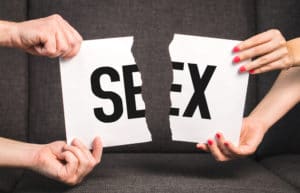 Libido has its ebbs and flows. If you take stock of your sexual desire over your lifetime you’ll likely notice times when you have wanted sex all the time and others where the thought hardly crosses your mind. Fluctuations in libido are completely normal, but just because it’s normal doesn’t mean it might not feel challenging. Here’s how to cope with low sexual desire.
Libido has its ebbs and flows. If you take stock of your sexual desire over your lifetime you’ll likely notice times when you have wanted sex all the time and others where the thought hardly crosses your mind. Fluctuations in libido are completely normal, but just because it’s normal doesn’t mean it might not feel challenging. Here’s how to cope with low sexual desire.
How to cope with low sexual desire or lack of libido.
First, you must identify when low desire is a problem. Likely this will be easy as it will be causing some feelings of distress in yourself or potential issues with a partner. However, if you are not distressed by your libido that’s ok too. Many people find other acts of intimacy incredibly satisfying. Additionally, you may be asexual and feel little to no drive at all.
However, if you find low libido to be distressing either for yourself or in your relationships, it can be helpful to identify what might be negatively affecting your libido, especially if this feeling is a shift for you. Common causes of low libido are medications, medical issues, body image issues, stress, mental health struggles, and relationship challenges. If you can start identifying the things that hurt your libido you can start making plans to fix those. For example, if work is leaving you too stressed and exhausted to be present sexually, setting boundaries around ending work at a certain time may help.
Often low libido is a symptom of a larger issue. Perhaps you have found yourself feeling disconnected from your partner, or because sex hasn’t occurred in a while, any affectionate touch feels like an obligation to have sex which causes anxiety. If you feel that your relationship is negatively affecting your libido, discuss it openly and honestly with your partner to see if you can work together in a positive way.
Responsive or contextual desire
Additionally, we often think of libido as spontaneous desire. But many people experience responsive or contextual desire. This means the environment and lead-up are important to “getting the engine running” or that you may need to start some sensual touching and get into a sexy headspace with your partner before your body starts feeling desire and arousal. It can be helpful to broaden your understanding of what “counts as sex”. Penetrative sex is not the be-all and end-all of sex. If you can embrace novelty, creativity, and flexibility in the bedroom, more sex acts and opportunities for intimacy will become available.
To begin, start small and see if you can challenge your beliefs around sex and start incorporating new acts. Sharing fantasies and incorporating sexual content like podcasts and articles may help keep sex front and center in your mind. Exploring your sexuality solo may also be helpful. This can be through masturbation, burlesque class, or even just dressing up in a way that makes you feel confident and sexy. And of course, sex should feel good. If sex isn’t enjoyable it will often feel like work, and that will not help arouse desire. Make sure you tell your partner what your body wants and needs.
 Your journey to a more satisfying sex life
Your journey to a more satisfying sex life
Communication is key, but so are patience and compassion. As you develop an understanding of what helps and hurts your libido, it’s important to be kind to yourself and your partner. Low libido does not have to feel like a curse, but it may take time to figure out. If you find yourself struggling, a sex therapist can be a wonderful support. Learning to cope with low sexual desire is part of your journey to a more satisfying sex life.
Contact us today to schedule a complimentary 15-minute phone consultation or to book an appointment.

